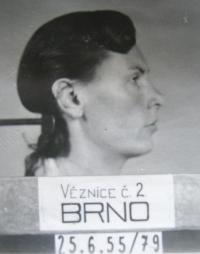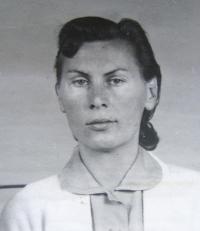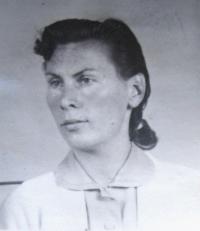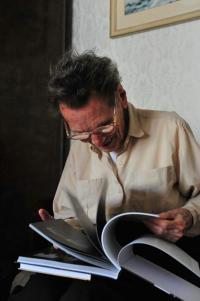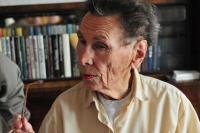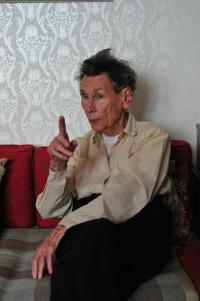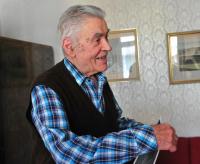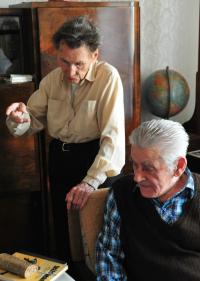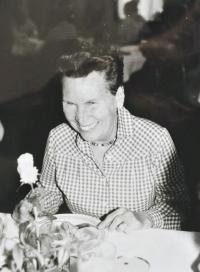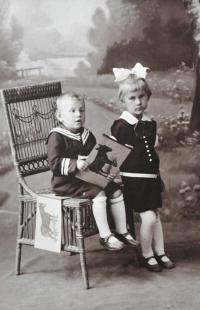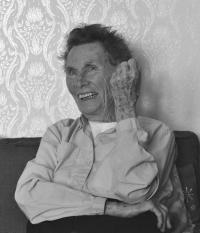I was always happy when I managed to dupe the Communists

Download image
Květoslava Musilová, née Kolačná, was born on the 1st of May 1921 in Old Brno - a district of the city that was more German than Czech. She spent her first five years of school at the practice school of the teaching institute. Her parents Antonín and Marie also had a son, Antonín, one year younger than Květoslava. Her father was a police inspector, her mother tended to the family hearth, as was usual at the time. In 1933 the family moved to Purkyně Street in Brno-Královo Pole [King’s Field - transl.], where Květoslava attended a reformed grammar school. Her classmates included the musician Karel Kraugartner or the poet Jan Skácel. She also met her future husband there. During her grammar school years, World War II broke out and Czechoslovakia became the Protectorate of Bohemia and Moravia. Květoslava Kolačná had already experienced the changes in the Brno Germans in the ’30s, in the later years she was a witness to much hostility between young Czechs and Germans. She herself was an ardent patriot who honoured the ideals of the First Republic and president Edvard Beneš. Her family was one of those active in Sokol, in the Czechoslovak Church and even with membership in the Czechoslovak National-Socialist Party. In 1938 she took part in the Sokol “flocking” [“sokol” means falcon, a “flocking” is a sports gathering of Sokol members - transl.] in Prague, trusting that nothing bad can happen to the republic with president Beneš at the helm. The annexation of the Sudetes and the following 5th of March 1939 were thus a great shock to her and a reality check. However, she had excellent professors at school who still guided their students towards patriotism and education. She graduated successfully in 1941. She went on to study at a language institute and to work as a teacher at a vocational school in Frenštát pod Radhoštěm, subsequently also at Náměšť nad Oslavou. The liberation found Květoslava Kolačná in a little village not far from Tasov. The Russian soldiers had orders forbidding them to drink alcohol, and they behaved very well - a fact that people back in Brno found hard to believe. Among other things, the liberation of Czechoslovakia brought with it the re-opening of universities. Immediately in 1945, Květoslava entered the Faculty of Law of the Masaryk University in Brno. At the same time - in the autumn of 1945 - she started to be active within the Czechoslovak National-Socialist Party (ČSNS). She tackled the first three post-war years with great enthusiasm. At the faculty she became a member of the students’ club Lawyer (Právník) which elected its representatives according to their party membership. Among the classmates that she got to know at the faculty were Mojmír Povolný, Zdeněk Kessler. She met those same people through her party activity - conducting clipping services at the Brno headquarters of the ČSNS or taking part in events organised by the party-based Economic Club (Hospodářský klub). Through these activities she acquainted herself with Vlastislav Chalupa, head of the well-known Section for Scientific Politics at the Regional Executive Board of ČSNS, or with the regional secretary of ČSNS, Reiter, and others, such as the Brno MP’s Uhlířová and Bátková. She also met with Milada Horáková. Her post-February [post-coup - transl.] contact with friends from the ČSNS later proved to be disastrous for Kolačná. In 1947 the political situation began to intensify, and the national socialists within the Lawyer decided to achieve a majority in the club which would allow them to edge out members representing the Communist Party of Czechoslovakia (KSČ). Their plan was successful, but it also caused Kolačná to be expelled from the faculty after February 1948. After her involuntary leave, Kolačná began work as an office clerk at NE Pilana [“national enterprise” - transl.]. She later found out about new staffing for healthcare, and became a radiography assistant, working first in Hranice and later in Brno again. Even after the 1948 coup, she kept up her connections with friends from the former ČSNS, especially with people close to Zdeněk Kessler and Miroslav Káňa. She knew of their illegal activities - collecting and archiving economical and political news from Czechoslovakia with the aim to get that information out into the world. She knew that the group was in contact with exiles Vlastislav Chalupa and Mojmír Povolný. As was made clear after the 1989 revolution, the group around Zdeněk Kessler was under State Security surveillance right from the start, the blame for which lay mostly on Vlastislav Chalupa. Kessler and co. stood on trial in March 1953. The same year, State Security began collecting information on Květoslava Kolačná. In 1954 it had already been decided to assign her her own personal operation file, as she was suspected of membership in the illegal national-socialist organisation. On the 25th of June 1955 she was finally arrested. Kolačná was held in custody at Příčná Street in Brno. She was then transferred to Cejl to await her trial. The main hearing took place on the 28th of October 1955 in Olomouc. The Brno Regional Court convicted her of misprision of felony and of the felony of attempting to abandon the country, and sentenced her to three-and-a-half years of maximum-security prison, a thousand crown fine and the loss of citizenship rights for three years. However the punishment was reduced by the general amnesties of 4th March 1953 and 9th March 1955, for which reason the sentence was completed on the 9th of November 1955. Kolačná was not released until two days later. The world after her release seemed a more colourful place to Kolačná. She returned to her office work at NE Pilana for a short while, but because of a lack of radiography assistants, she found herself a place at the hospital in Luhačovice. Although she failed to pass political screening in 1958, she was allowed to stay conditionally. She held the same position in Brno-Countryside and Ivančice. She ended up in the District National Health Institute (OÚNZ) in Brno, the next stop being retirement. In 1966, Květoslava Kolačná married her former grammar school classmate Miroslav Musil. Unfortunately, the couple is childless. She renewed contact with Zdeněk Kessler and others of her former friends after they were also released. In 1968 she took part in the founding meeting of K 231 in Brno, but after the former political prisoners started squabbling, she took no further active part in the group. Despite this, she was for a short time thrilled by the democratization of the country. When November 1989 came, she did not have the strength to actively participate in the events. Even so, she did join in the efforts of the Confederacy of Political Prisoners (KPV) in Brno, beside important figures such as Zdeněk Kessler and Stanislav Drobný. She has also always been a faithful member of the Czechoslovak Hussite Church - even becoming a member of the Council of Elders in the Brno parish of Královo Pole in the ’90s. Faith and God were also a great comfort to her during her time in prison. In 1990 she was officially presented the title of Doctor of Law. When Květoslava Musilová thinks back on her life, she never forgets to note that it always made her happy when she had the opportunity to trick the Communists. Květoslava Musilová passed away on March, 2017
